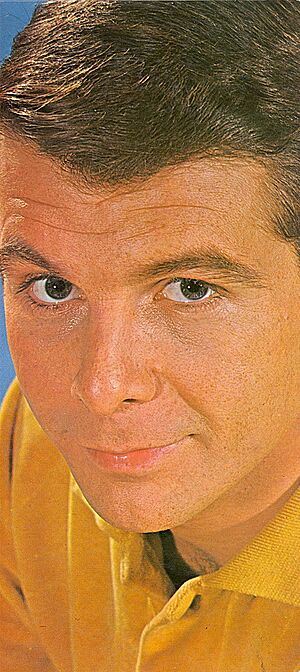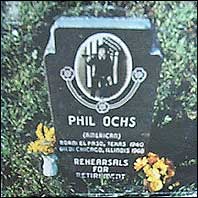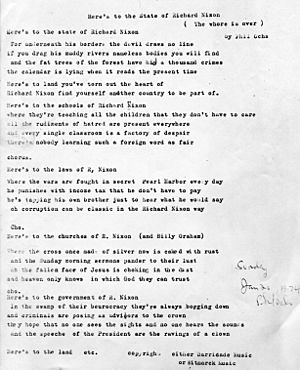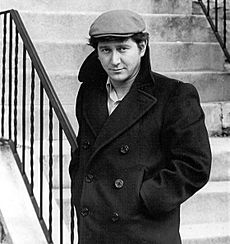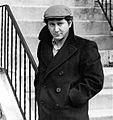Phil Ochs facts for kids
Quick facts for kids
Phil Ochs
|
|
|---|---|
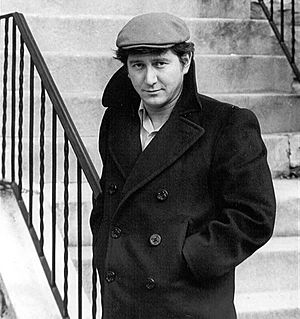
Ochs in 1975
|
|
| Background information | |
| Birth name | Philip David Ochs |
| Born | December 19, 1940 El Paso, Texas, U.S. |
| Died | April 9, 1976 (aged 35) Far Rockaway, New York City, U.S. |
| Genres | Folk, protest music, folk rock, Baroque pop |
| Occupation(s) | Singer-songwriter |
| Instruments | Guitar, vocals, piano |
| Years active | 1962–1976 |
| Labels | Elektra, A&M |
Philip David Ochs (born December 19, 1940 – died April 9, 1976) was an American singer and songwriter. He was famous for his "topical songs," which were like musical news reports about important events. Phil Ochs was known for his clever lyrics, sharp humor, and strong involvement in political causes. He wrote hundreds of songs in the 1960s and 1970s and released eight albums.
Ochs performed at many important events during the 1960s, a time of big changes in culture. He sang at rallies against the Vietnam War and for civil rights, as well as at student and labor events. He also performed in famous concert halls like New York City's Town Hall and Carnegie Hall. Phil Ochs believed in social democracy, but after the protests in Chicago turned violent, he became even more passionate about revolutionary ideas.
After writing many songs in the 1960s, Phil Ochs faced challenges with his mental health in the 1970s. He struggled with bipolar disorder and passed away in 1976.
Some of his most famous songs include "I Ain't Marching Anymore", "When I'm Gone", "Changes", "Crucifixion", "Draft Dodger Rag", "Love Me, I'm a Liberal", "Outside of a Small Circle of Friends", "Power and the Glory", "There but for Fortune", and "The War Is Over". He was inspired by musicians like Woody Guthrie, Pete Seeger, Buddy Holly, and Elvis Presley.
Contents
Phil Ochs's Life Story
Early Years and Musical Beginnings
Phil Ochs was born in El Paso, Texas, on December 19, 1940. His father, Jacob Ochs, was a doctor from New York, and his mother, Gertrude Phin Ochs, was from Scotland. His father served in World War II, and his experiences affected his mental health. Because of this, the Ochs family moved often. They lived in places like Far Rockaway, New York, and Columbus, Ohio. Phil grew up with an older sister, Sonia (called Sonny), and a younger brother, Michael.
As a teenager, Phil was a very talented clarinet player. He even played with an orchestra before he was 16. But he also loved the music he heard on the radio, like early rock and roll from Buddy Holly and Elvis Presley, and country music. He also loved movies and watched many films, especially those with heroes like John Wayne.
From 1956 to 1958, Phil attended Staunton Military Academy in Virginia. After graduating, he went to Ohio State University to study journalism. There, he became very interested in politics, especially the Cuban Revolution of 1959. He met a fellow student named Jim Glover who introduced him to folk music artists like Pete Seeger and Woody Guthrie. Jim also taught Phil how to play the guitar.
Phil started writing articles for the student newspaper, often about radical ideas. When some of his articles were not published, he started his own underground newspaper called The Word. Soon, his two main interests—politics and music—came together, and he began writing political songs. He even formed a duo called "The Singing Socialists" with Jim Glover.
Phil also performed at a folk club in Cleveland. There, he met folksinger Bob Gibson, who greatly influenced his songwriting. Phil left Ohio State before graduating and moved to New York City to become a folksinger, just like Jim Glover.
Becoming a Folk Star (1962–1966)
Phil Ochs arrived in New York City in 1962 and quickly became a key part of the Greenwich Village folk music scene. He was known for his strong voice and songs about current events like war, civil rights, and labor issues. While others called his songs "protest songs," Phil preferred to call them "topical songs" because they were about specific topics in the news. He often said he built his songs from stories he read in Newsweek magazine.
By 1963, he was famous enough to be invited to the Newport Folk Festival. There, he performed songs like "Too Many Martyrs" and "Power and the Glory", a patriotic song that made the audience cheer. Other famous performers at the festival included Joan Baez and Bob Dylan. Phil returned to Newport in 1964, but he wasn't invited in 1965 when Bob Dylan famously played an electric guitar. Phil found Dylan's choice amusing and admired his bravery.
Phil performed at New York's Carnegie Hall and Town Hall. Throughout his career, he sang at many different places, from civil rights rallies to anti-war protests and concert halls.
He released his first three albums with Elektra Records: All the News That's Fit to Sing (1964), I Ain't Marching Anymore (1965), and Phil Ochs in Concert (1966). Critics and fans loved his music, and his album sales grew with each new release. On these albums, Phil only used his acoustic guitar. They featured many of his topical songs, as well as musical versions of old poems.
Phil Ochs and Bob Dylan had a friendly rivalry. Dylan once said, "I just can't keep up with Phil. And he just keeps getting better and better and better."
In 1962, Phil married Alice Skinner, and they had a daughter named Meegan. They separated in 1965 but never officially divorced.
Phil greatly admired President John F. Kennedy. When Kennedy was assassinated in November 1963, Phil was deeply saddened.
New Sounds and Political Action (1967–1969)
In 1967, Phil Ochs moved to A&M Records and Los Angeles. He recorded four albums with A&M: Pleasures of the Harbor (1967), Tape from California (1968), Rehearsals for Retirement (1969), and Greatest Hits (1970). For these albums, Phil tried new things with his music. Instead of just his acoustic guitar, he added other instruments and even orchestras, hoping to create a popular pop-folk sound.
Some critics didn't like his new musical direction. One critic joked that Phil's guitar playing wouldn't be much worse if his hand was "webbed." Phil, with his sense of humor, even included this funny comment in his songbook. Despite his humor, he was disappointed that his music wasn't becoming a big hit.
None of Phil's songs became huge hits, but "Outside of a Small Circle of Friends" got a lot of radio play. However, Joan Baez had a Top Ten hit in the U.K. with her cover of Phil's song "There but for Fortune."
Even with his new musical experiments, Phil never stopped his protest work. He was very worried about the Vietnam War and performed at many anti-war rallies. In 1967, he organized two big rallies himself. He continued to write anti-war songs like "The War Is Over."
Phil was also involved in creating the Youth International Party, known as the Yippies, with activists like Jerry Rubin and Abbie Hoffman. He also supported Eugene McCarthy's campaign for president in 1968. Phil helped plan the Yippies' "Festival of Life" at the 1968 Democratic National Convention in Chicago. He witnessed the violence between the police and protesters and was even arrested. Phil also bought a young pig that became the Yippie "presidential candidate" named "Pigasus the Immortal".
The events of 1968, including the assassinations of Martin Luther King Jr. and Robert F. Kennedy, the Chicago police actions, and the election of Richard Nixon, left Phil feeling very sad and disappointed. The cover of his 1969 album, Rehearsals for Retirement, showed a tombstone with the words: PHIL OCHS (AMERICAN) BORN: EL PASO, TEXAS, 1940 DIED: CHICAGO, ILLINOIS, 1968
In December 1969, Phil testified in court for the Chicago Seven, a group of activists. He even sang his song "I Ain't Marching Anymore" for the press outside the courthouse, which was shown on the evening news.
Changing Direction (1970)
After the events of 1968, Phil Ochs decided to try a new approach. He felt that many Americans weren't listening to topical songs anymore. So, he decided to go back to his musical roots in country music and early rock and roll. He wanted to be "part Elvis Presley and part Che Guevara". He even got a shiny gold suit, just like Elvis used to wear!
Phil wore the gold suit on the cover of his 1970 album, Greatest Hits, which was full of new songs in rock and country styles. He went on tour with a rock band, singing his own songs and medleys of songs by Buddy Holly, Elvis, and Merle Haggard. His fans were surprised by this new Phil Ochs. His concerts at Carnegie Hall in March 1970 were very successful and were recorded for the album Gunfight at Carnegie Hall.
Phil faced challenges with his songwriting and felt down during this time. He didn't record any more albums after this. However, he performed at the first benefit concert for Greenpeace in October 1970.
Travels and Activism (1971–1975)
In August 1971, Phil Ochs traveled to Chile, where he met Chilean folksinger Víctor Jara. They became friends. Later that year, in Uruguay, Phil and his friend David Ifshin were arrested. They were then sent to Argentina, where they were arrested again. They were supposed to be sent to Bolivia, but the American pilot of their plane refused to let Bolivian authorities take them off the aircraft. They flew to Peru instead, and Phil returned to the United States a few days later.
Phil found it hard to write new songs, but he did update his sarcastic song "Here's to the State of Mississippi" into "Here's to the State of Richard Nixon," criticizing President Nixon.
In December 1971, John Lennon invited Phil to sing at a big benefit concert at the University of Michigan for John Sinclair. Phil performed alongside Stevie Wonder, Allen Ginsberg, and many others.
Even though he was disappointed by the 1968 election, Phil continued to support anti-war candidates like George McGovern in the 1972 presidential election.
In 1972, Phil was asked to write a theme song for the movie Kansas City Bomber, but his song was not used in the film.
Phil loved to travel. In 1972, he visited Australia and New Zealand. In 1973, he traveled to Africa, visiting countries like Ethiopia, Kenya, and South Africa.
On September 11, 1973, the government in Chile was overthrown, and his friend Víctor Jara was killed. Phil was very upset and decided to organize a benefit concert to help the people of Chile. The concert, "An Evening with Salvador Allende," took place in May 1974 in New York City. It featured singers like Pete Seeger, Arlo Guthrie, and Bob Dylan, as well as political activists. Dylan agreed to perform at the last minute, which helped the concert sell out quickly.
After the Chile concert, Phil and Dylan talked about touring together, but it didn't happen. However, this idea later led to Dylan's famous Rolling Thunder Revue tour.
The Vietnam War officially ended on April 30, 1975. Phil Ochs planned a final "War Is Over" rally in New York's Central Park on May 11. More than 100,000 people came to hear Phil, Harry Belafonte, Odetta, Pete Seeger, Paul Simon, and others. Phil and Joan Baez sang a duet, and he closed the show with his song "The War Is Over"—finally, a true declaration that the war was done.
Later Life and Passing
In January 1976, Phil Ochs moved to Far Rockaway, New York, to live with his sister Sonny. He was very tired and mostly watched television or played cards with his nephews. He saw a doctor who diagnosed his bipolar disorder and prescribed medication. On April 9, 1976, Phil Ochs passed away at his sister's home.
Phil Ochs's Lasting Impact
Even almost fifty years after his death, Phil Ochs's songs are still important today. He continues to inspire singers and fans around the world. There are many online groups and websites dedicated to his music, and new articles and books are still being written about him.
Phil was one of the first artists to sing about the Vietnam War. In 1964, he performed "Talking Vietnam Blues," which was one of the first protest songs to mention Vietnam by name.
His sister, Sonny Ochs, organizes "Phil Ochs Song Nights" where different performers sing his songs to keep his music and memory alive. His brother, Michael Ochs, is a famous photo archivist of 20th-century music stars. Phil's daughter, Meegan Lee Ochs, worked with Michael to create a special box set of his music called Farewells & Fantasies. Meegan has a son named Caiden, who is Phil's only grandchild.
In February 2009, Phil Ochs received the Elaine Weissman Lifetime Achievement Award from the North American Folk Music and Dance Alliance.
In September 2014, Meegan Lee Ochs donated her father's archives to the Woody Guthrie Center in Tulsa, Oklahoma. This collection includes his notebooks, journals, videos of his performances, his famous gold lamé suit, photographs, and other important items.
Songs Covered by Other Artists
Many artists have covered Phil Ochs's songs, including Joan Baez, Cher, Judy Collins, John Denver, Ani DiFranco, Pete Seeger, and They Might Be Giants. In 1998, a two-CD set called What's That I Hear?: The Songs of Phil Ochs was released, featuring 28 covers by artists like Billy Bragg, Nanci Griffith, and Arlo Guthrie. All profits from this album went to the American Civil Liberties Union and Sing Out! magazine.
Other tribute albums have been released, like Poison Ochs: A Tribute to Phil Ochs (2003) and Learn: The Songs of Phil Ochs (2005).
Artists have also updated Phil's songs with new lyrics to fit current times. For example, Jello Biafra and Mojo Nixon updated "Love Me, I'm a Liberal" for the Clinton era. Pearl Jam covered "Here's to the State of Mississippi" with updated lyrics to include more recent political figures. In 2002, Richard Thompson added a new verse to "I Ain't Marching Anymore" to reflect modern American foreign policy.
Neil Young has said that Phil Ochs was a major influence on his music. In 1969, Young called Phil "a genius" and said he was "on the same level with Dylan in my eyes." In 2013, Young performed "Changes" at Farm Aid and included it on his 2014 album of covers, A Letter Home.
Phil Ochs in Popular Culture
Many people admired Phil Ochs, including writer Breece D'J Pancake and actor Sean Penn. Phil's daughter, Meegan, who worked for Sean Penn, said they often talked about making a movie about her father.
Author Jim Carroll dedicated his autobiography, The Basketball Diaries (1978), to Phil Ochs.
Phil Ochs is mentioned in a song by They Might Be Giants called "The Day." He is also mentioned in Stephen King's novels The Tommyknockers (1987) and Hearts in Atlantis (1999). In the 2019 novel Revolutionaries by Joshua Furst, Phil Ochs appears as a character. He is also mentioned in David Bowie's 2013 song "(You Will) Set the World on Fire."
Films About Phil Ochs
In 1984, Michael Korolenko directed a movie about Phil Ochs called Chords of Fame. It included interviews with people who knew Phil and performances of his songs by other folk musicians.
Filmmaker Ken Bowser directed a documentary called Phil Ochs: There but for Fortune, which came out in 2010. This film features old footage of Phil and important events from the 1960s civil rights and peace movements. It also includes interviews with his friends, family, and colleagues. An edited version of the film was shown on the PBS American Masters series in 2012.
Phil Ochs's Albums
Studio Albums and Live Recordings
- All the News That's Fit to Sing (Elektra, 1964)
- I Ain't Marching Anymore (Elektra, 1965)
- Phil Ochs in Concert (Elektra, 1966)
- Pleasures of the Harbor (A&M, 1967)
- Tape from California (A&M, 1968)
- Rehearsals for Retirement (A&M, 1969)
- Greatest Hits (A&M, 1970)
- Gunfight at Carnegie Hall (A&M Canada, 1974)
- There and Now: Live in Vancouver 1968 (Rhino, 1991)
- Live at Newport (Vanguard, 1996)
- Amchitka (Greenpeace, 2009)
- Live Again! (RockBeat, 2014)
- Live in Montreal 10/22/66 (Rockbeat, 2017)
Images for kids
See also
 In Spanish: Phil Ochs para niños
In Spanish: Phil Ochs para niños
 | Roy Wilkins |
 | John Lewis |
 | Linda Carol Brown |


